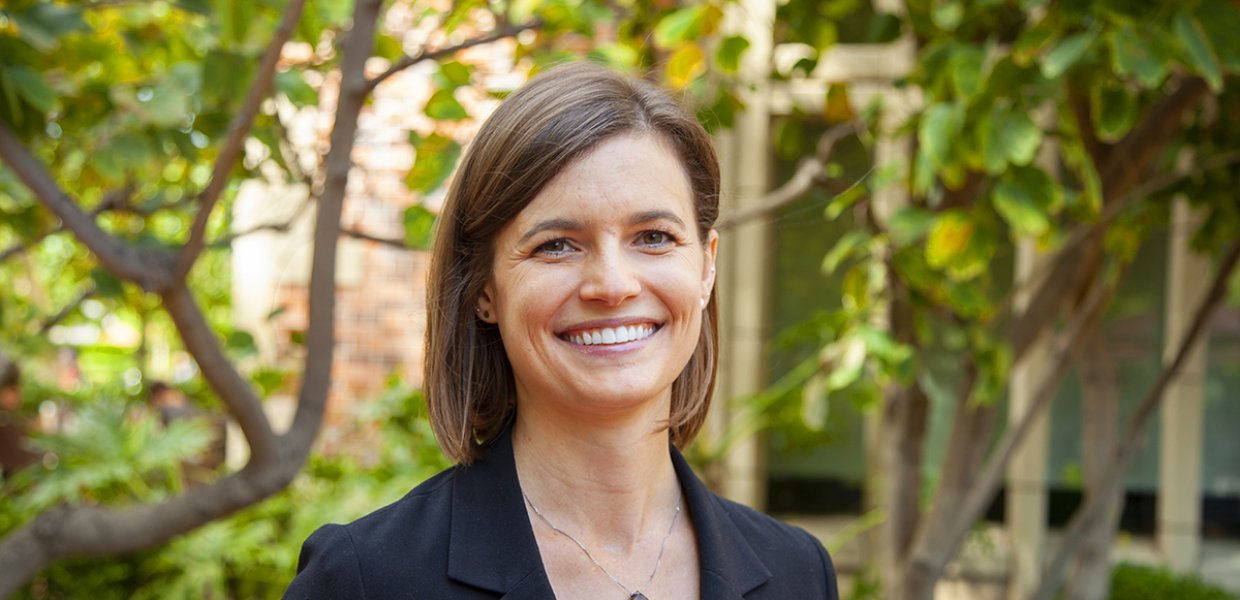Traci Gillig will be earning her Ph.D. in communication from USC Annenberg at Friday’s commencement, but she won’t have long to celebrate. She’s already been hired as an assistant professor of communication at Washington State University.
“I’m very happy to be staying in academia — and getting started on that tenure process,” Gillig said with a laugh. She already knows what classes she’ll be teaching in the fall: “Organizing for Social Change” and “Gender in Media.”
Gillig’s quick hire after earning her Ph.D. comes as no surprise to anyone who followed her career as a doctoral candidate at USC Annenberg. Her work on health communication, and especially with the nonprofit Brave Trails, earned her numerous awards and accolades, including two this year: Eleanor P. Eells Award for Research in Practice from the American Camp Association; and the Outstanding Reviewer Award from International Communication Association, LBGTQ Division.
“Traci is an unusually accomplished young scholar, who combines academic and professional experience, and has developed a research program that addresses important challenges facing vulnerable young people,” says professor Larry Gross, Gillig’s dissertation adviser. “There is no doubt that Traci will continue to make significant contributions in the best tradition of socially relevant scholarship.”
Once the Chicago-area native had earned both her bachelor’s and master’s degrees in communication from Purdue University, she went into health communication for a couple of years, first with the FDA Center for Tobacco Products in Washington D.C., then with Edelman, a communications firm in Los Angeles. “All of those experiences I had before coming back to school were awesome,” she said. “But there’s just something about being in academia, where you can have an idea about something you want to study, and then actually make that happen — you’re also able to work with students who are exploring different classes on campus and thinking about possible careers for themselves. Having that sort of balance of working with students and research is really exciting for me.”
Her dissertation work was done in partnership with a nonprofit called Brave Trails, launched in 2014 as the first camp in the western United States for LGBTQ youth. “Their programming is part traditional summer camp — hiking, arts and crafts,” explains Gillig, who has worked with Brave Trails since its founding. “They also offer resources and activities that pertain specifically to the campers’ LGBTQ identities, helping them navigate the stressors that can come from that.”
She first met the camp’s founders when she was volunteering at the Los Angeles LGBT Center. As she worked with them, she saw an opportunity to connect their new camp with research. What started as a “really small research project” eventually grew, in the five years of her doctoral studies, into being her dissertation project.
Her fieldwork at Brave Trails tied into her research about the experiences of people who are part of marginalized groups and the forms of messaging — interventions, interpersonal relationships, structural factors — that influence their health and well-being, with the goal to improve health outcomes in marginalized populations.
“As that sense of community continues to grow, the question becomes, what sort of outcomes does that have for youth, and how can we learn from what they’re doing at Brave Trails, and offer up information that applies to other efforts?” Gillig said.
Her second line of research looked at how people beyond marginalized populations perceive those groups, “and how things like media portrayals and other interventions can help shift their attitudes in a way that's beneficial for the marginalized group in terms of generating understanding and supportive policies,” Gillig said.
“Traci’s research is a model of multi-method investigation: Building on a real-life program for LGBTQ youth and their parents, she has been able to combine field observation with immediate and long-term follow-up survey data,” Gross said. “The results of this and other projects have already produced a number of journal articles and ultimately will be incorporated in a book.”
Even after she starts teaching at Washington State University, Gillig will fly down to Los Angeles to continue working with Brave Trails, and will also conduct research in Pullman, Washington. As she prepares for the commencement ceremony on Friday, Gillig says she’s grateful for what’s she’s learned at USC Annenberg.
“I started out with relatively little knowledge about how to actually do academic research,” she said. “I’ve just been really happy to have been with this group of colleagues — and the students that I’ve been able to work with are already going off and doing awesome things. Being part of a community like that is one of the most rewarding parts of being an academic.”
